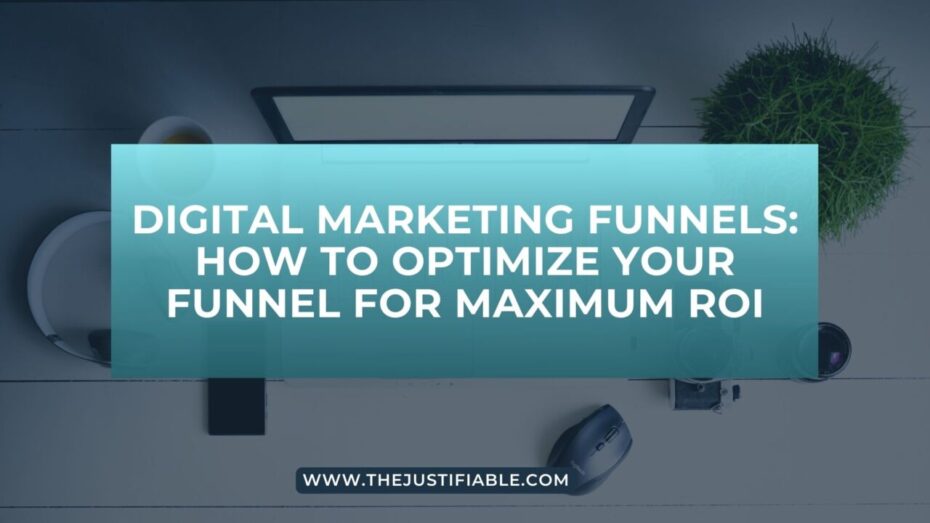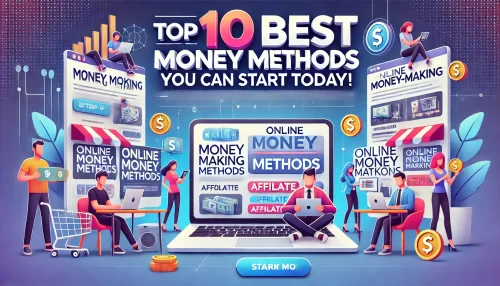Table of Contents
Digital marketing funnels! The digital marketing landscape is continually evolving, and businesses must adapt their strategies to maximize their return on investment (ROI).
One critical element of digital marketing success is understanding and leveraging digital marketing funnels to guide potential customers through a strategic process from awareness to conversion and ultimately, loyalty.
In this comprehensive guide, we’ll delve into the intricacies of digital marketing funnels, exploring their importance, optimization techniques, and how to measure their effectiveness. We’ll also examine content creation, metrics, KPIs, and analytics, and discuss channel-specific marketing funnel strategies.
Understanding Digital Marketing Funnels
Digital marketing funnels are a systematic and visual representation of the customer journey, detailing the various stages a prospect goes through before making a purchase.
By comprehending these stages, businesses can identify pain points, improve marketing strategies, and enhance the overall customer experience.
The Importance of Digital Marketing Funnel Strategy
Creating a well-structured digital marketing funnel strategy is crucial for achieving marketing objectives. By understanding the different stages in the funnel and the customer’s journey, marketers can develop targeted campaigns and content that effectively move prospects from one stage to the next, ultimately leading to higher conversion rates.
B2B vs B2C Digital Marketing Funnel Approaches
Although the overall concept of digital marketing funnels is the same for both B2B and B2C businesses, the specific tactics and strategies may vary. B2B marketing funnels often emphasize nurturing relationships, providing in-depth content, and addressing industry-specific pain points.
On the other hand, B2C marketing funnels may focus more on emotional triggers and building a connection with the brand.
Multi-Channel Marketing Funnels Integration
Integrating multiple marketing channels into a digital marketing funnel strategy is essential for meeting potential customers at their preferred touchpoints. This integration creates a seamless and consistent experience across platforms, ensuring prospects receive the right message at the right time.
Key Marketing Funnel Stages
To create targeted campaigns, marketers must understand the typical stages within a marketing funnel, including awareness, consideration, conversion, and loyalty.
Lead Generation Funnel Techniques
Lead generation is the process of attracting and capturing potential customers‘ interest in your products or services. Some effective lead generation funnel techniques include:
- Content marketing: Create valuable and informative content that addresses the target audience’s pain points and positions your brand as an industry expert.
- Search engine optimization (SEO): Optimize your website and content to rank higher on search engines, driving organic traffic to your site.
- Social media marketing: Utilize social media platforms to engage with your audience and share content that resonates with their interests.
- Pay-per-click (PPC) advertising: Run targeted advertising campaigns on search engines and social media platforms to drive high-intent traffic to your site.
Customer Acquisition Funnel Best Practices
Customer acquisition involves converting leads into paying customers. To optimize this stage of the funnel, consider implementing these best practices:
- Personalized email marketing campaigns: Craft personalized and segmented email campaigns that address the specific needs and preferences of your audience.
- Targeted landing pages: Create dedicated landing pages tailored to the needs of specific audience segments or marketing campaigns.
- Remarketing strategies: Employ remarketing tactics to re-engage potential customers who have previously interacted with your brand but have not yet converted.
Optimizing Your Online Sales Funnel for Success
Maximizing the effectiveness of your digital marketing funnels requires optimizing each stage, ensuring a seamless experience for potential customers throughout their journey.
Digital Marketing Conversion Funnel Optimization
Conversion funnel optimization focuses on increasing the rate at which potential customers progress from one stage to the next. This process typically involves analyzing customer behavior, identifying bottlenecks, and implementing targeted strategies to boost conversion rates.
Effective Marketing Funnels for Conversion
Creating effective marketing funnels for conversion involves understanding your target audience’s needs, preferences, and pain points. This insight allows you to develop targeted campaigns, content, and messaging that resonate with your audience, guiding them towards making a purchase.
Funnel-Based Marketing Campaigns
Funnel-based marketing campaigns are designed to guide potential customers through the different stages of the marketing funnel. These campaigns often involve a combination of content, advertising, and email marketing that engages and nurtures prospects at each stage of their journey.
Digital Marketing Funnel Automation and Software
Leveraging automation and software solutions can help streamline and optimize your digital marketing funnels, saving time and resources while improving overall performance.
Digital Marketing Funnel Templates
Digital marketing funnel templates provide a pre-built structure for your marketing funnels, ensuring a cohesive and efficient design. These templates can be customized to suit your specific business needs and objectives, allowing for a more streamlined marketing funnel creation process.
Digital Marketing Funnel Software Solutions
Digital marketing funnel software solutions enable businesses to automate various aspects of their marketing funnels, from lead nurturing to customer segmentation. These tools often include features such as email marketing automation, landing page builders, and analytics dashboards, which provide valuable insights into funnel performance.
Metrics, KPIs, and Analytics in Digital Marketing Funnels
Monitoring and analyzing key metrics, KPIs, and analytics is vital for understanding the effectiveness of your digital marketing funnels and making data-driven decisions to improve their performance.
Tracking Digital Marketing Funnel Metrics
Tracking digital marketing funnel metrics allows you to identify strengths and weaknesses in your marketing strategies, enabling you to make informed decisions for optimization. Some essential metrics to track include:
- Conversion rate: The percentage of prospects who move from one stage of the funnel to the next.
- Cost per acquisition (CPA): The average cost of acquiring a new customer.
- Average deal size: The average value of a closed sale.
- Time to conversion: The average time it takes for a prospect to move through the entire funnel and become a customer.
Digital Marketing Funnel KPIs
Key Performance Indicators (KPIs) are specific, measurable metrics that help you gauge the success of your digital marketing funnel strategies. Some common KPIs include:
- Number of leads generated.
- Lead-to-customer conversion rate.
- Customer lifetime value (CLV).
- Churn rate (the percentage of customers who discontinue their relationship with your business).
Digital Marketing Funnel Analytics
Digital marketing funnel analytics involves collecting, analyzing, and interpreting data to gain insights into the performance of your marketing funnels. These insights can help you identify areas for improvement and make data-driven decisions to optimize your marketing strategies.
Optimizing Digital Marketing Funnels for ROI
Maximizing ROI in digital marketing funnels requires ongoing analysis, optimization, and adjustment of your marketing strategies.
Sales Funnel Digital Marketing Agency Expertise
Working with a sales funnel digital marketing agency can provide you with the expertise and resources necessary to optimize your marketing funnels effectively. These agencies typically offer a range of services, including strategy development, funnel creation, and performance analysis.
Internet Marketing Funnel System Analysis
Conducting a thorough analysis of your internet marketing funnel system can help you identify areas for improvement, enabling you to make targeted optimizations that drive better results. This analysis should consider factors such as customer behavior, conversion rates, and overall funnel performance.
Content Creation and Channel-Specific Marketing Funnel Strategies
Developing engaging content and implementing channel-specific marketing funnel strategies are essential for reaching your target audience and guiding them through the buying journey.
Marketing Funnel Content Creation
Creating content that aligns with each stage of the marketing funnel is crucial for engaging your audience and addressing their needs as they progress through their customer journey.
Inbound Marketing Funnel Strategies
Inbound marketing funnel strategies involve attracting potential customers to your brand through valuable and informative content. These strategies may include blog posts, whitepapers, webinars, and social media content that address your audience’s pain points and showcase your expertise.
Customer Journey Funnel Mapping
Mapping the customer journey funnel allows you to identify the touchpoints and types of content that best resonate with your audience at each stage of their journey. This understanding can help you create a more targeted and effective content strategy, ultimately leading to higher conversion rates.
Channel-Specific Digital Marketing Funnels
Different marketing channels require unique strategies and tactics to optimize your digital marketing funnels effectively. Understanding how to leverage each channel can help you maximize your marketing efforts and drive better results.
Social Media Marketing Funnel Tactics
Social media marketing funnel tactics involve utilizing social media platforms to engage with your audience, share relevant content, and guide them through the marketing funnel.
Tactics may include creating engaging social media posts, running targeted advertising campaigns, and monitoring social media interactions to gather insights into your audience’s preferences and needs.
Email Marketing Funnel Strategies
Email marketing funnel strategies involve using personalized and segmented email campaigns to nurture leads and drive conversions. These strategies may include sending targeted content based on a prospect’s stage in the marketing funnel, using automation to deliver timely and relevant messages, and tracking email engagement metrics to optimize your campaigns.
Paid Advertising Marketing Funnel Implementation
Paid advertising marketing funnel implementation involves leveraging platforms such as Google Ads and social media advertising to target high-intent prospects and drive them to your website or landing pages.
This implementation may include creating compelling ad copy, targeting specific audience segments, and optimizing your bidding strategy to maximize ROI.






